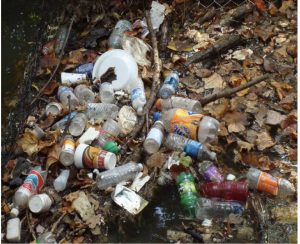Representatives from the Lower Eastern Shore Group of the Maryland Chapter of the Sierra Club urged Berlin Town Council members to advocate for the passage of what is known as the “bottle bill” when the 2025 session of the Maryland General Assembly kicks off in January.

Photo courtesy Sierra Club
By Tara Fischer, Staff Writer
Representatives from the Lower Eastern Shore Group of the Maryland Chapter of the Sierra Club urged the Berlin Town Council to advocate for the passage of the Beverage Container Recycling, Refund, and Litter Reduction Program when the 2025 session of the Maryland General Assembly kicks off in January.
The group’s vice chair, Jacky Grindrod, and executive committee member, Cindy Dillon, addressed the Berlin Mayor and Council during the public comments section of their Monday, July 22 meeting.
“I know that is typically not what you are working on, but I am aware that the opinion of the Berlin council is very valuable when talking with state legislators who will be responsible for passing this bill,” Dillon said, addressing the body.
The Sierra Club is an environmental organization that describes itself as dedicated to “exploring, enjoying, and protecting the wild places of the earth; practicing and promoting the responsible use of the earth’s ecosystems and resources; educating and enlisting humanity to protect and restore the quality of the natural and human environment; and using all lawful means to carry out these objectives.”
Grindrod and Dillon, members of the Lower Eastern Shore chapter, presented themselves as a “useful resource for Berlin and its areas when environmental issues arise.”
They introduced the “Bottle Bill” to the council and asked the local government to push for its passage in January. The legislation calls for placing a 10-to-15-cent deposit on all beverage containers, including plastic, glass, and metal, at the initial purchase. The money would be refunded to the buyer when the materials are returned for recycling.
Dillon said that the return methods may be bag drops or reverse vending machines.
“There is a variety of technology that would be used for this,” she said.
Larger venues, such as restaurants, bars, and hotels, would not have to deliver their containers anywhere. They would receive their deposits back when the system operators picked up the drink cases.
The bill, which Dillon maintains would be self-financing from registration and producer fees, raw material sales, penalties, and unclaimed deposits, aims to address the nearly four billion containers that end up in landfills, waterways, and streets in Maryland every year.
According to the executive member, approximately 5.2 billion beverage vessels are sold in the state annually, but only 23% are recycled. States with deposit programs see up to 90% of their drink containers recycled.
The potential law was filed as Senate Bill 642 during the 2024 session of the Maryland General Assembly. While the legislation did not pass last year, advocates intend to reintroduce it in 2025.
Grindrod argued that protections like the Bottle Bill would reduce plastic pollution and improve waterways.
“Plastic is made of chemicals and fossil fuels,” she said. “In all its forms, the production, processing, and disposal of plastic causes serious health issues for many people, like asthma, chronic coughing, rashes, and skin allergies…We must work to reduce the amount of plastic currently poisoning us and our children.”
“We can reduce the harm to some degree by using metal drinking cups and reusing single-use plastic bags and straws and takeout containers,” the vice chair continued. “…the real success comes from actually and permanently reducing the amount of virgin plastic used in manufacturing products. We need to improve the recyclability of the products and increase their recycling capture.”
Dillon also noted that the program may even save local governments money. Materials would be diverted from costly landfill incinerators, and town councils could institute their redemption facilities and receive a handling fee per container.
The 2025 Maryland General Assembly’s 90-day legislative session will convene in Annapolis on January 8. Once the Bottle Bill is properly filed, it will receive an identification number.
